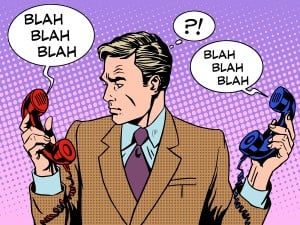 Every renter brings their own personality traits when comes to different aspects of the landlord-tenant relationship, especially when it comes to communication styles.
Every renter brings their own personality traits when comes to different aspects of the landlord-tenant relationship, especially when it comes to communication styles.
To help you prepare for what to expect from the renter demographic we are continuing a series of articles on Types of Tenants: The Good, The Bad, & The Ugly. This 4 part series explores the good, the bad, and the ugly types of tenant behavior when it comes to important terms of the landlord-tenant relationship like paying rent, following lease terms, maintaining the property and communicating effectively.
Types of Tenants – Part 1 explored rent paying behavior most often found in renters. Types of Tenants – Part 2 examined rule abiding behavior and how different tenant personalities treat lease terms, property rules, and laws affects the landlord-tenant relationship.
In Types of Tenants – Part 3 looked at common behaviors when it comes to how a tenant will treat their rental home in regards to property maintenance, cleanliness, and property damage.
In Part 4 of Types of Tenants: The Good, The Bad and The Ugly we will look at the most common types of tenant behavior when it comes to communicating with landlords and property managers.
Types of Tenants – Part 4: Tenant Communication
Appropriate communication is a crucial factor in the landlord-tenant relationship. Tenants are expected to report maintenance issues and voice concerns that relate to a property manager’s responsibilities. A good landlord or property manager needs to be receptive to tenant communication and respond appropriately and in a timely manner.
A renter’s communication style can range from courteous and appropriate to annoying or non-existent.
Good: The Communicator
A good tenant will openly communicate with their property manager or landlord about any concerns or questions they experience during tenancy. The communicator will inform management about any maintenance issues before they become an expensive problem. The communicator will also be available to answer a landlord’s inquiry or notices as needed. If any issues come up that affects their ability to pay rent on time, the communicator will be open about their situation.
Bad: The Complainer
There can be too much of a good thing, and a tenant that communicates too much can fall into the complainer category. The complainer never seems to be satisfied with their rental property. Whether the neighbors are too loud or weird smells are suddenly coming from the carpet, there is always a new urgent message from the complainer. The complainer will deem their concerns the most important priority and may turn aggressive if their needs are not immediately addressed. The complainer can even take it a step further and start bossing around your other tenants, which can create animosity within your community.
It can be difficult to evaluate the seriousness of a complainer’s needs. A complainer may be voicing concerns about property maintenance or other community related complaints regarding tenants or neighbors. For property maintenance, you should provide effective ways for tenants to submit work orders that you can then assign a priority level. Your rental rules should outline the best way for a tenant to inform you of necessary property maintenance, complaints or emergency issues. Requiring that a tenant submit written notifications through email correspondence or an online tenant portal are great ways to prevent constant phone calls from a complaining tenant. Providing information about what classifies an emergency can also help you mitigate after hours phone calls.
Ugly: The Avoider
Just like too much communication can be a bad tenant personality, zero communication is just as bad. The avoider will go to great lengths to not talk with their property manager or landlord. The avoider personality goes beyond a tenant that doesn’t like to chit chat in the management office, but a tenant that does not relay important that directly affects the landlord-tenant relationship.
Avoider tenant personalities tend to pop up when something goes wrong in the landlord-tenant relationship. From a tenant’s perspective it might seem easier to ignore a problem and not communicate it to their landlord, rather than face an awkward conversation.
An avoider may fail to share with their property manager that :
- An appliance is broken, causing extra damage to the property
- They are going to be late on the rent this month
- They are not able to make a rent payment at all this month
- They have a long-term guest staying at the rental property
- A secret pet lives in the property
Avoidance is the worst solution to these common problems in a rental situation. To a landlord, a lot of these issues could be handled more appropriately if a tenant simply shared what was going on. Although the tenant might face fines or other consequences, there is a chance that the landlord could help fix the problem, rather than let it build up to an unmanageable situation. In a lot of cases, a tenant’s honesty will encourage a landlord to help find a solution both parties are comfortable with.
Solution: Share expectations and provide guidance about how a tenant should communicate issues with you.
Unfortunately, communication styles are difficult to screen for and can even be seen as subjective screening criteria, which could lead to discrimination claims. The best defense is to provide clear expectations about how tenants should contact you, what issues they are required to communicate to you and the levels of urgency for each issue. You should also outline for your tenants how you will respond to each issue.
Here are some helpful suggestions for handling tenant complaints from the article How to Manage Fighting Tenants:
- Be Informative. Provide your tenants instructions about how to file a complaint. Do you want your tenants to call you every time they have a complaint? Do you want them fill out a complaint form in the leasing office? Do you prefer an email? Regardless of the method you choose, communicating this to your tenants will help you avoid late night calls to your emergency phone line.
- Acknowledge your tenant’s complaint. Regardless of the your preferred complaint system, you should respond and acknowledge your tenant’s complaint as soon as possible. It is important that you take complaints seriously, so your tenants feel valued and respected. (Even if you have to suppress an eyeroll from Tenant Tina for another complaint about Tenant Tom’s “heavy breathing” through the thin walls.) Inform your tenant that you recognize their concern and explain that you will take action about any lease violating behavior. If no action can be taken, explain why.
If you find yourself stressing out or getting annoyed with a complainer tenant, you might consider letting them break the lease early if they simply cannot find satisfaction residing at your rental property. When you have a good tenant you should do your best to encourage lease renewals in order to prevent a bad or ugly tenant taking over a new lease.
Proactively managing tenant communication, even when you face bad or ugly communicative styles, encourages tenant retention and helps you be a great property manager.






